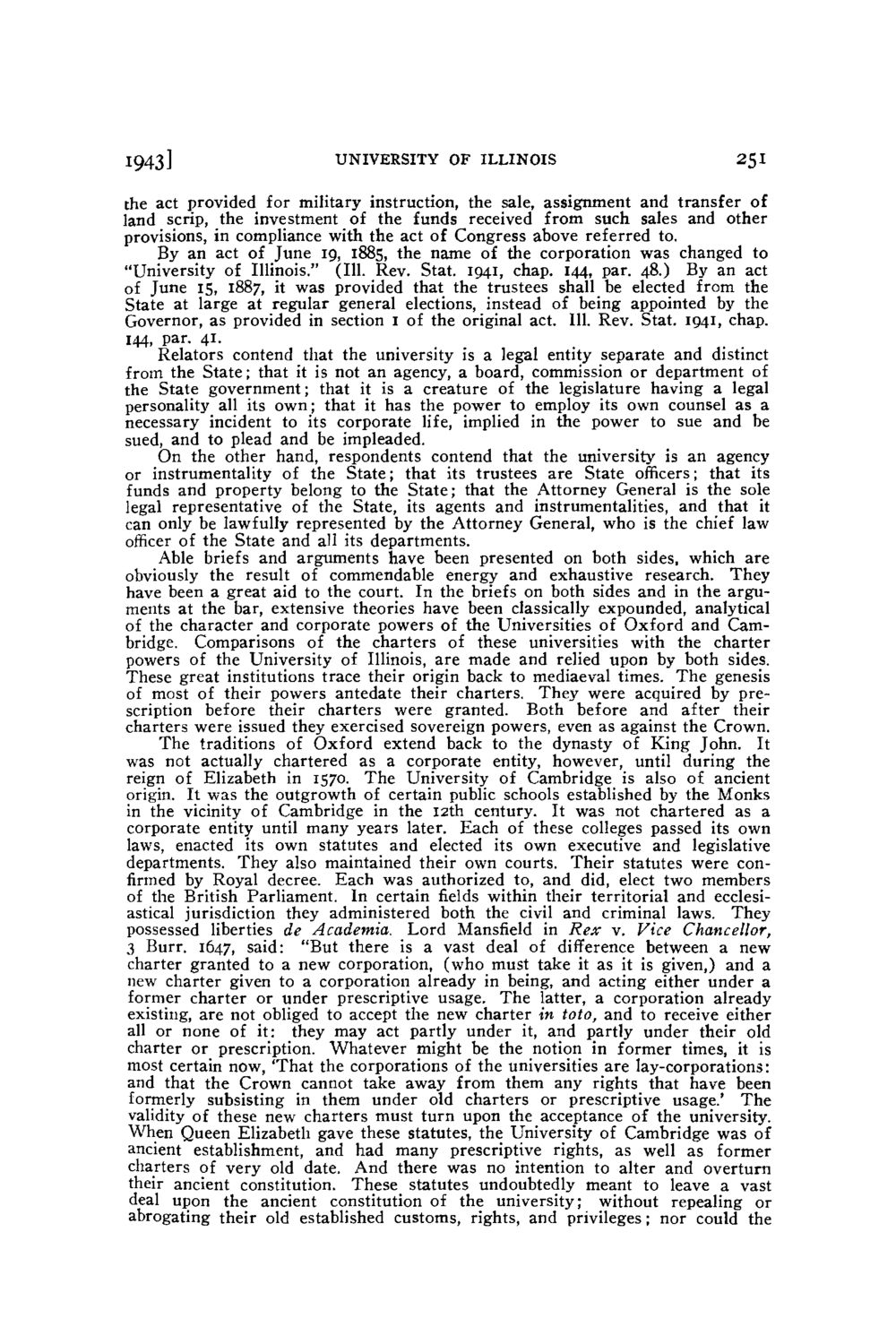| |
| |
Caption: Board of Trustees Minutes - 1944
This is a reduced-resolution page image for fast online browsing.

EXTRACTED TEXT FROM PAGE:
1943] UNIVERSITY OF ILLINOIS 251 the act provided for military instruction, the sale, assignment and transfer of land scrip, the investment of the funds received from such sales and other provisions, in compliance with the act of Congress above referred to. By an act of June 19, 1885, the name of the corporation was changed to "University of Illinois." (111. Rev. Stat. 1941, chap. 144, par. 48.) By an act of June 15, 1887, it was provided that the trustees shall be elected from the State at large at regular general elections, instead of being appointed by the Governor, as provided in section I of the original act. 111. Rev. Stat. 1041, chap. 144, par. 41. Relators contend that the university is a legal entity separate and distinct from the S t a t e ; that it is not an agency, a board, commission or department of the State government; that it is a creature of the legislature having a legal personality all its o w n ; that it has the power to employ its own counsel as a necessary incident to its corporate life, implied in the power to sue and be sued, and to plead and be impleaded. On the other hand, respondents contend that the university is an agency or instrumentality of the S t a t e ; that its trustees are State officers; that its funds and property belong to the S t a t e ; that the Attorney General is the sole legal representative of the State, its agents and instrumentalities, and that it can only be lawfully represented by the Attorney General, who is the chief law officer of the State and all its departments. Able briefs and arguments have been presented on both sides, which are obviously the result of commendable energy and exhaustive research. They have been a great aid to the court. In the briefs on both sides and in the arguments at the bar, extensive theories have been classically expounded, analytical of the character and corporate powers of the Universities of Oxford and Cambridge. Comparisons of the charters of these universities with the charter powers of the University of Illinois, are made and relied upon by both sides. These great institutions trace their origin back to mediaeval times. T h e genesis of most of their powers antedate their charters. They were acquired by prescription before their charters were granted. Both before and after their charters were issued they exercised sovereign powers, even as against the Crown. The traditions of Oxford extend back to the dynasty of King John. It was not actually chartered as a corporate entity, however, until during the reign of Elizabeth in 1570. T h e University of Cambridge is also of ancient origin. It was the outgrowth of certain public schools established by the Monks in the vicinity of Cambridge in the 12th century. It was not chartered as a corporate entity until many years later. Each of these colleges passed its own laws, enacted its own statutes and elected its own executive and legislative departments. They also maintained their own courts. Their statutes were confirmed by Royal decree. Each was authorized to, and did, elect two members of the British Parliament. In certain fields within their territorial and ecclesiastical jurisdiction they administered both the civil and criminal laws. They possessed liberties de Accidentia. Lord Mansfield in Rex v. Vice Chancellor, 3 Burr. 1647, said: "But there is a vast deal of difference between a new charter granted to a new corporation, (who must take it as it is given,) and a new charter given to a corporation already in being, and acting either under a former charter or under prescriptive usage. The latter, a corporation already existing, are not obliged to accept the new charter in toto, and to receive either all or none of it: they may act partly under it, and partly under their old charter or prescription. Whatever might be the notion in former times, it is most certain now, 'That the corporations of the universities are lay-corporations: and that the Crown cannot take away from them any rights that have been formerly subsisting in them under old charters or prescriptive usage.' T h e validity of these new charters must turn upon the acceptance of the university. When Queen Elizabeth gave these statutes, the University of Cambridge was of ancient establishment, and had many prescriptive rights, as well as former charters of very old date. And there was no intention to alter and overturn their ancient constitution. These statutes undoubtedly meant to leave a vast deal upon the ancient constitution of the university; without repealing or abrogating their old established customs, rights, and privileges; nor could the
| |